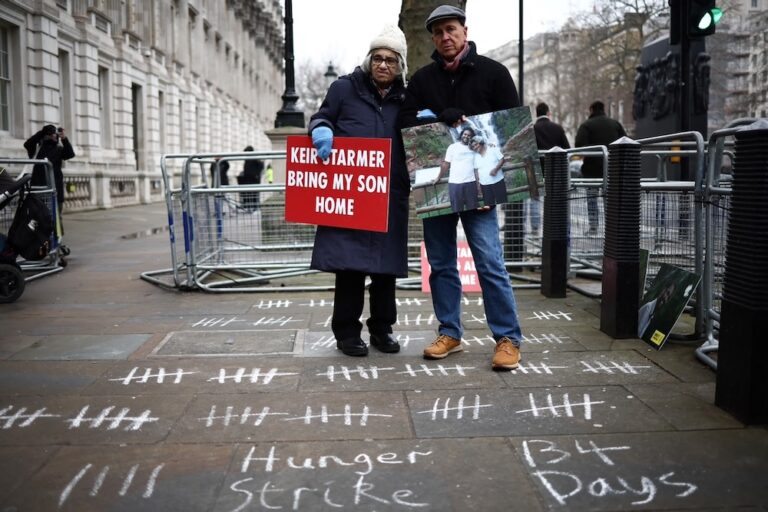**Updates IFEX alerts of 23, 18, 16 and 15 February 2000, 14 October and 16 June 1999** (ARTICLE 19/IFEX) – The following is a 7 March 2000 ARTICLE 19 letter to several European Foreign Ministers drawing their attention to the repressive NGO law in Egypt: Dear [Minister], You may recall that we wrote to you […]
**Updates IFEX alerts of 23, 18, 16 and 15 February 2000, 14 October and 16 June 1999**
(ARTICLE 19/IFEX) – The following is a 7 March 2000 ARTICLE 19 letter to several European Foreign Ministers drawing their attention to the repressive NGO law in Egypt:
Dear [Minister],
You may recall that we wrote to you on 15 June 1999 about Association Law 153 and other ways in which the Egyptian government was failing to meet its obligations to freedom of expression and other human rights. The concerns we would like to raise with you now are connected with the current prosecution of Hafez Abu Saeda, Secretary General of the Egyptian Organisation of Human Rights. Mr Abu Saeda is charged with accepting money from a British Parliamentary Committee, under a 1992 military order which forbids receiving money from both foreign and local sources without first obtaining permission from the government and Mr Abu Saeda faces between seven and fifteen years in prison.
This matter will be of particular concern to you as it potentially affects any development and human rights work you may have supported in Egypt since 1992. We hope that you will take action in view of the chilling effect the use of this law is having on NGOs and the signal that the Egyptian government’s success in this prosecution would send to other governments seeking to control the activities of NGOs.
As well as being a direct interference between local NGOs and their international funders, this action also sends a clear signal to any NGO pursuing direct bilateral contact for human rights or development projects that they may face the same situation. Moreover, by enforcing legislation stipulating that overseas funding may only be accepted with prior permission from the government, the state is directly threatening the independence, autonomy and integrity of NGOs in Egypt.
On 13th February 2000 Mr Abu Saeda was referred to an (Emergency) Supreme State Security Court. Mr Abu Saeda is charged with breaching Article 1 (6) of Military Decree No. 4/1992 which forbids collecting, receiving, declaring or even asking for donations without the permission from the Ministry of Social Affairs. This Decree was originally imposed after a major earthquake to prevent the Muslim Brotherhood from fundraising overseas for emergency relief. The initial charges against Mr Abu Saeda were based on “accepting funds from a foreign country with the aim of carrying out acts that would harm Egypt, receiving donations without obtaining permission from the competent authorities, (and) disseminating false information abroad that would harm the country’s national interests”.
Mr Abu Saeda is accused of having accepted a cheque from the British Parliament’s All-Party Human Rights Committee related to a project on legal aid for women and the handicapped under a contract signed in 1997. We understand that, if convicted, he faces a prison term of between seven and fifteen years, according to Article 2 (1) of the Decree.
As well as being a direct attack on the autonomy of NGOs in Egypt, these spurious charges clearly demonstrate the Egyptian government’s unwillingness to allow independent human rights monitoring to take place in Egypt. The government has long been frustrated with EOHR because of its influential reports on human rights violations in Egypt.
ARTICLE 19 recognises the need for independent audits of organisations’ financial affairs to ensure, for example, that taxes are paid and to identify corruption. However, there can be no justification for Decree No 4/1992, and the severe sanctions it provides for.
This matter is being closely monitored by many other Egyptian NGOs, who are naturally concerned about the implications for their work. There is a possibility that the Egyptian government may simply drop the charges against Mr Abu Saeda while leaving the Military Decree in place. This would in no way solve the problem or address the serious concerns of Egyptian NGOs. We ask that you use your influence by taking up this issue as a matter of urgency with the Egyptian government and encouraging it not only to drop the charges against Mr Abu Saeda, but to repeal Decree No.4/1992.
Yours sincerely
Andrew Puddephatt
Executive Director


